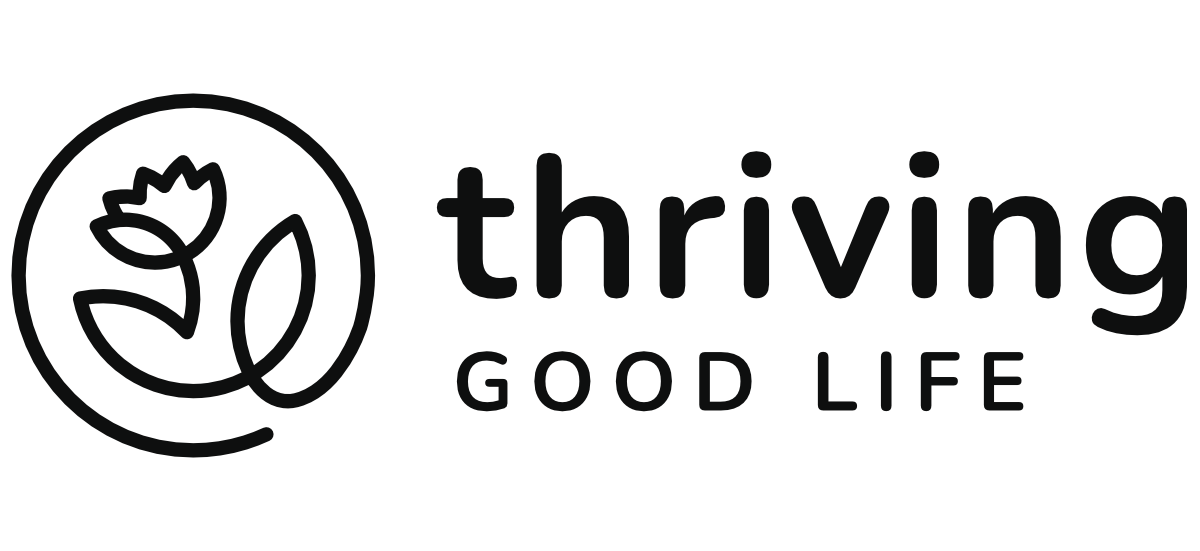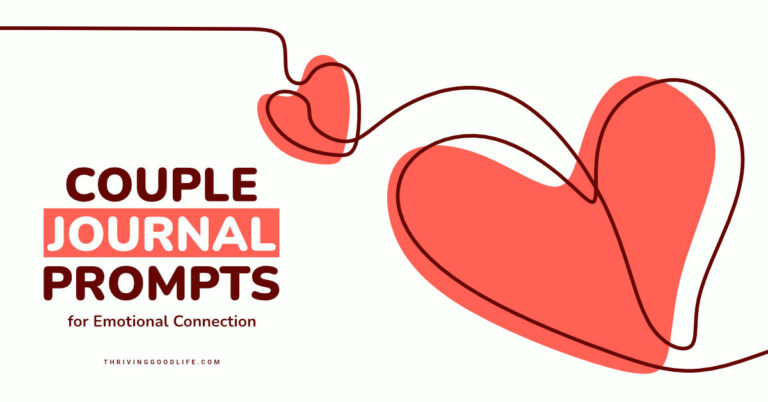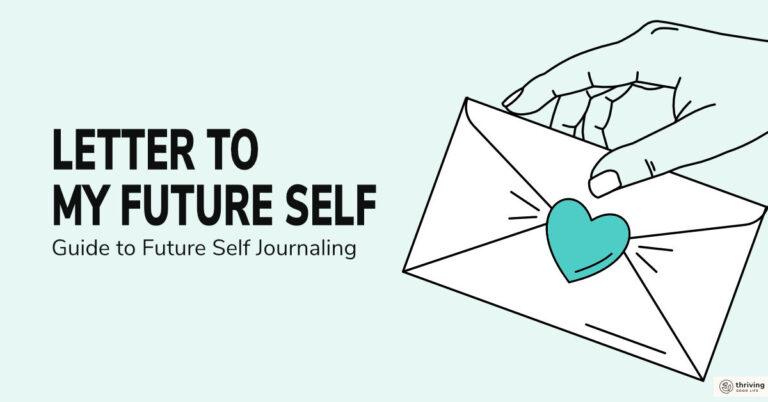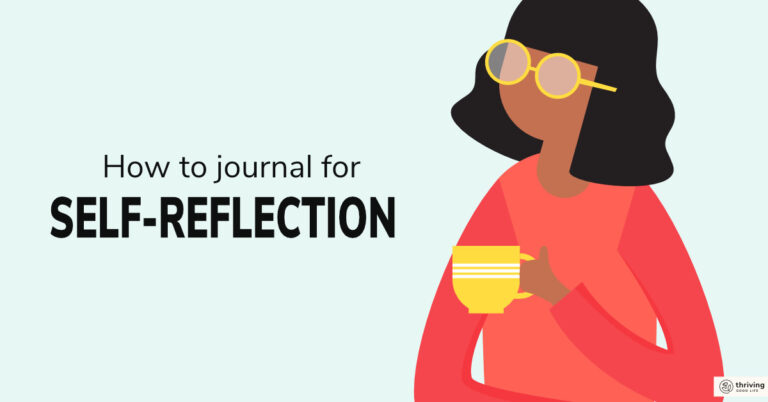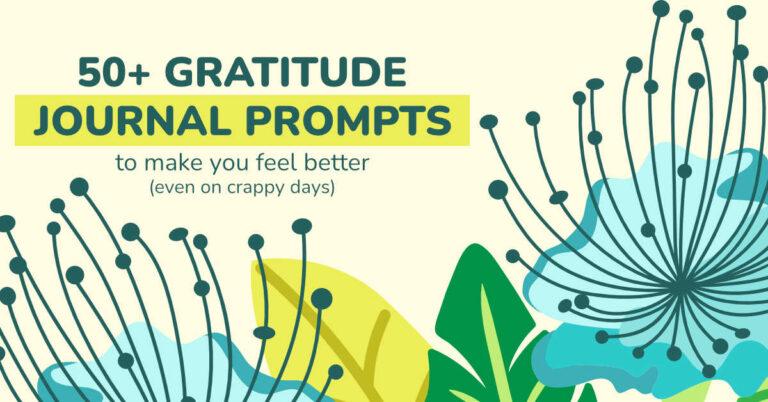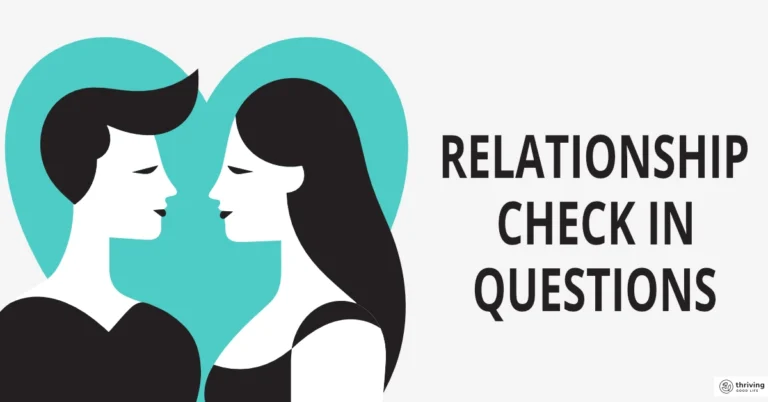Journaling helps you slow down and be honest with yourself, especially when you’re dating someone new. It lets you step back from the excitement, spot red flags you might overlook, and figure out whether this person is actually a good fit for you. Before things get serious, journaling gives you space to notice what you’d usually ignore.
A friend of mine dated someone for two years before ending things.
Later she told me, “I knew in the first month he wasn’t right for me, but I fell for him so hard.”
She was lucky it was only two years.
Some people go five, 10, even 15 years staying stuck in an unhealthy relationship that was never right from the beginning.
It usually goes like this.
We meet someone. We find them highly attractive. They seem to be into us. We feel that initial rush of excitement, and get drunk on the idea of being with this person. So when they do something that feels off, we’re tempted to downplay it.
And so we continue to invest in someone who is not the right fit for us.
Months or years later after finally ending things, we wonder why we wasted so much time on them. We replay every red flag we ignored, every excuse we made, and every moment we convinced ourselves things would get better.
So how do we stop falling into this cycle?
How do we catch ourselves before we sink years into the wrong relationship?
To understand that, we need to look at how we got here in the first place. And how journaling changes everything when it comes to dating and relationships.
🎯 Grab my free Gut Check tool—it’ll help you figure that out fast.
Why Do We Choose the Wrong Relationships?
Societal pressure & fear of being alone
We fear society judging us for being alone, especially when we reach a certain age where we “should” have settled down. Maybe gotten married. Had a couple of kids. A cat. A dog. And then live happily ever after without complaint.
Social media’s picture-perfect relationships reinforce that expectation.
Did you know, about a 3rd of social media users who are single, and looking for love, feel worse when they see happy couples online? 1
For some, seeing people loved-up makes us think we’re missing out or falling behind in life. And because we don’t have what they have, we must be doing something wrong.
There’s this real push to conform, and it comes from all sides. Our families expect it, our culture rewards it, and society tells us to follow the rules.
But beyond all those external pressures, is the pressure we put on ourselves.
The fear of being alone is not to be taken lightly. We want someone to cuddle with and talk about the ups and downs of our day, and share our dreams.
Life can be incredibly lonely if you don’t have someone fighting in your corner. And this makes it real tempting to entertain someone who is never going to meet our needs.
Yet, the biggest obstacle in choosing the right person is in a lack of self-trust.
Not trusting what we need
Many of us struggle to understand what we need to feel fulfilled and genuinely loved. Or worse, we doubt whether we’ll ever find what we truly want.
So the temptation to settle for “good enough” is there.
I think there’s a simple truth behind this.
We don’t know or trust ourselves enough to say, “I have good qualities. I’m a great catch for the right person, but to be happy, I need this, this, this and this.”
We get distracted by surface qualities – looks, charm, status, while ignoring whether someone can provide the emotional security we actually need. It’s like choosing a house because you love the paint job, without checking if the foundation is solid.
There’s also the fear that naming our needs might make us seem “too demanding” or “high maintenance.” So we shrink ourselves, hoping someone will somehow provide what we want without us having to ask for it.
But understanding, and voicing, our needs starts with getting honest with ourselves first.
How Journaling Helps You See Dating Situations Clearly?
The one time we can be 110% honest about what’s going on with us, and how we really feel about it, is when we’re alone.
A journal is an extension of ourselves.
It’s the space where we can spill our raw, messy, unfiltered thoughts. The fears, doubts, desires, and dreams we might hesitate to say out loud. The truths we’re still figuring out.
It’s the one place where no one can judge us, or shame us for what we think, feel, or want.
But for it to work, we have to be honest. We have to let it all out without holding back. And we have to resist the temptation to judge ourselves.
A while back, I was pursued by this guy.
On the surface he checked every box. You know, the kind of guy who everyone liked.
He was easy on the eyes, had money in the bank, a career that rewarded him well enough to live in a swanky part of London, with a nice car. All the trappings.
But something felt… off.
I still decided to go out with him.
Right before our first date, I had this unsettling dream. I woke up with knots in my stomach.
No reason, no logic. Just a feeling I couldn’t shake.
I grabbed my journal and started writing. The first words that poured out were: “This guy… Mr-amazing-on-paper… will not save you a seat at the table.”
That thought sat with me. And sure enough, on our date, I saw it clear as day. This was not a man who cared about my wellbeing.
So I noped the hell out of there.
If I hadn’t journaled about that dream, I might have ignored my gut feeling. But because I wrote it down and let it sit with me, I recognized something very real.
Journaling didn’t just help me reflect.
It grabbed me by the shoulders and shook the truth into my soul.
Over time, a journal helps you stop making excuses, stop missing red flags, and start seeing the person you’re dating for who, and what they really are.
🎯 Grab my free Gut Check tool—it’ll help you figure that out fast.
3 Ways to Journal for Smarter Dating Decisions
We all love a good venting session, but journaling about the people you’re dating can be so much more than that. Use it to cut through the noise and confusion.
As you journal, look for things that help you decide what to do next.
Here are three areas to focus on:
1. Look at how past relationships shaped what you want
Instead of just writing about what happened, focus on what it tells you about your relationship needs.
- What past relationships or dating experiences left you feeling truly valued?
- What situations drained or frustrated you the most?
- Are there patterns in the type of people you attract or choose?
Example: “Looking back, I always felt safest with people who were emotionally open, but I keep getting drawn to distant, unavailable types. Why?”
2. Separate what you need from what just looks good on paper
A lot of people chase qualities that sound impressive but don’t actually make them happy. Use your journal to break that cycle.
- What qualities make you feel supported and at peace in a relationship?
- Overlooked something important just because someone looked good on paper? Why?
- Are there traits you thought mattered that actually don’t? What are these?
Example: “I keep saying I want someone ambitious, but what I need is someone who follows through on their word. Flashy job titles don’t mean they’ll show up for me.”
3. Get clear on your deal-breakers (and stick to them)
Ignore red flags now, and you’ll be kicking yourself later. Journaling helps you track when you’re tempted to make excuses for things you know don’t work for you.
- What past deal-breakers have you ignored, and how did that turn out?
- Which ones truly matter to you, no matter how great someone seems?
- How will you hold yourself accountable to those boundaries?
Example: “I told myself I’d never date someone emotionally unavailable again, but I keep excusing it when they dodge real conversations or only show up when it’s convenient for them. I can’t keep mistaking inconsistency for mystery.”
Related: How to Start a Journal
How Do You Spot Red Flags?
The signs of someone’s true character are often there from the start, especially in people who are emotionally healthy and transparent 2.
But we don’t always notice them.
Sometimes we’re drawn to what we want to see, filtering out anything that doesn’t fit the version of the person we hope they are. This is called progression bias. It’s the tendency to push forward in a relationship rather than question if it’s truly right 3.
Yet, deep down, we kind of know when something’s off.
One of the strongest ways to tell if someone is right for you is your gut.
It registers things before your mind fully processes them.
It just so happens that in dating situations, we’re quick to explain those feelings away, especially when we’re drawn to someone.
That feeling in your stomach is telling you something:
- It might be a subtle discomfort you brush off.
- It might be a quiet hesitation you can’t explain.
- Or it might be the strongest feeling of certainty that this IS the best person for you.
Listening to it could save you time, energy, and disappointment.
Or it could be the sign to go all in.
We make what researchers call thin-slice judgements on people 4, 5.
And that’s before they utter a single word.
We pick up on people’s energy, intentions, and motives early.
Ever stood next to someone and felt chills?
Or sensed someone was kind before they said a word? That’s your intuition at work.
But when we’re dating, we don’t always listen to that inner sense.
Attraction, excitement, and wishful thinking make it easy to overlook the flaws and incompatibilities screaming at us 6.
How Do You Trust Your Gut When Dating?
A simple journaling tool for testing your gut feelings.
Figure out how someone makes you feel. In your body. Not just your head.
After a date or conversation with someone, take a moment to listen to yourself. How do you feel? Energised and relaxed? Or drained and anxious?
Here, grab this template. It’s taken straight from my latest workbook — The Right Fit, and is designed to help you make clearer, more confident dating and relationship choices.
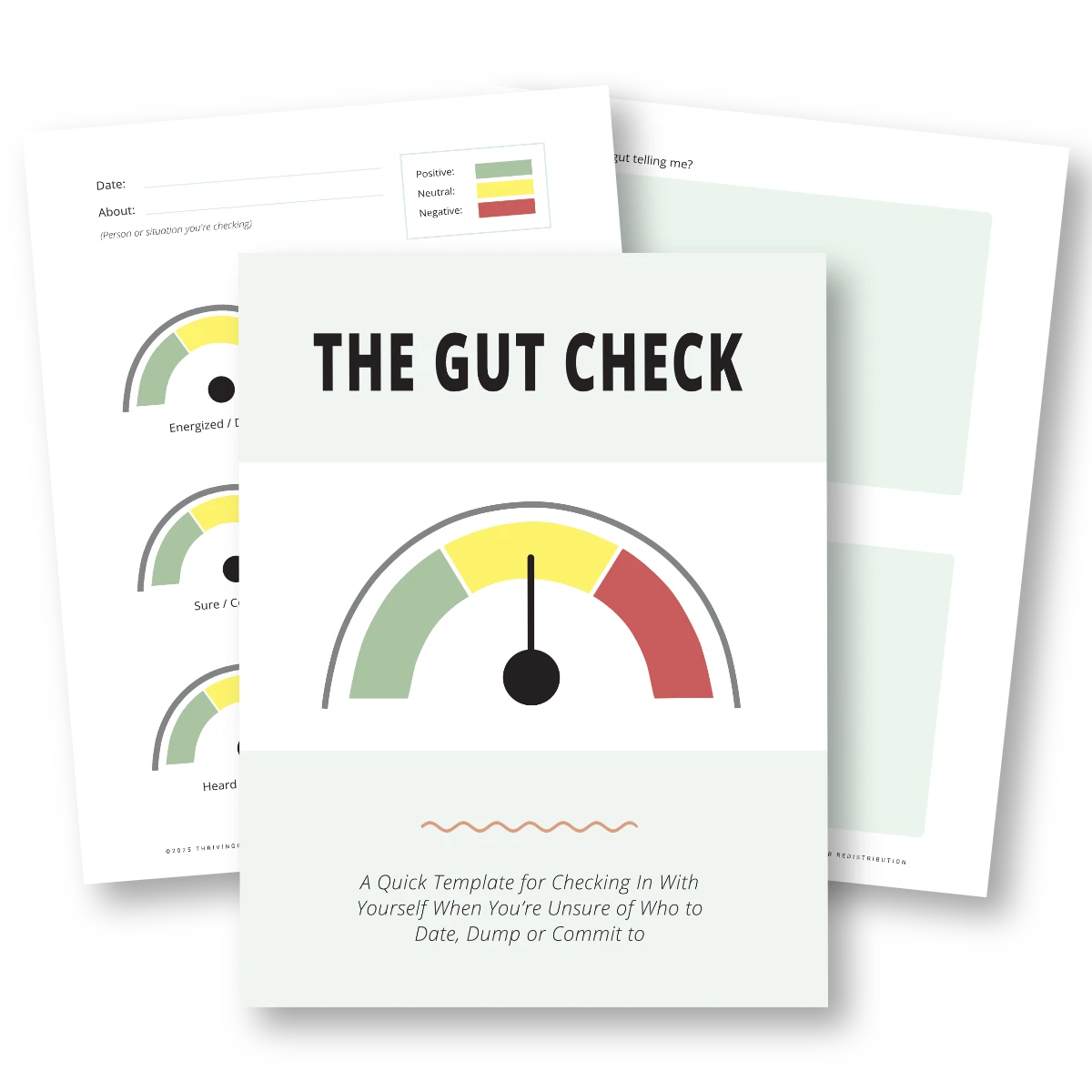
Get this Gut Check Tool (It’s Free)
Stop second-guessing a date, situationship, or potential partner. Use this simple tool to get clear on who feels right for you, and who doesn’t.
You’ll also find something extra waiting for you…
By signing up you agree to our T&Cs and Privacy Policy.
Download it and use it after your next date.
It might save you from spending months, or years with the wrong person.
—
Attraction and excitement can cloud judgment, but your gut doesn’t lie. If something feels off, it probably is. And if it feels right, you deserve to trust that too.
Journaling gives you the space to separate emotions from reality, to see patterns for what they are, and to stop wasting time on the wrong people. When you take the time to be honest with yourself, really honest, you start dating with clarity instead of just hope.
Because the right relationship won’t make you ignore red flags, question your worth, or convince yourself to stay. It’ll just fit.
If this post spoke to you, share it with someone who’ll appreciate it.
Footnotes
- Vogels, E., & Anderson, M. (2020, May 8). Dating and relationships in the digital age. Pew Research Center: Internet, Science & Tech.
- Kerr, L. G., Borenstein-Laurie, J., & Human, L. J. (2020). Are some first dates easier to read than others? The role of target well-being in distinctively accurate first impressions. Journal of Research in Personality, 88, 104017. https://doi.org/10.1016/j.jrp.2020.104017
- Joel, S., & MacDonald, G. (2021). We’re not that choosy: Emerging evidence of a progression bias in romantic relationships. Personality and Social Psychology Review, 25(4), 108886832110258. https://doi.org/10.1177/10888683211025860
- Thin-slice judgments mean we can form quick impressions of people in just a few seconds. These snap judgments are often surprisingly accurate. Our brain works behind the scenes, picking up tiny signals to help us decide if someone seems trustworthy, confident, or sketchy.
- Ambady, N., Bernieri, F. J., & Richeson, J. A. (2000). Toward a histology of social behavior: Judgmental accuracy from thin slices of the behavioral stream. _Advances in Experimental Social Psychology Volume 32_, _32_, 201–271. https://doi.org/10.1016/s0065-2601(00)80006-4
- Eastwick P. W., Finkel E. J., Eagly A. H. (2011). When and why do ideal partner preferences affect the process of initiating and maintaining romantic relationships? Journal of Personality and Social Psychology, 101, 1012–1032. https://doi.org/10.1037/a0024062
